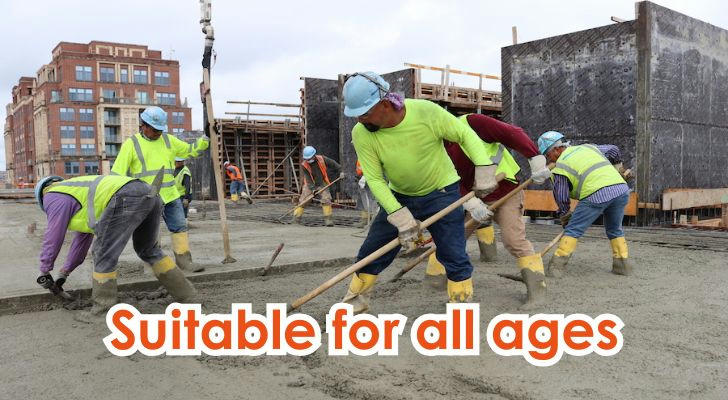Concrete Workers in the U.S.: High Pay, Great Benefits, and No Experience Needed
In recent years, the U.S. construction industry has faced an unprecedented labor shortage, especially in the concrete sector. As infrastructure investments rise and older workers retire, the demand for concrete workers has surged. The good news? No experience is needed to enter the field. Thanks to paid apprenticeships, structured training programs, and generous benefits, even total beginners can quickly transition into high-paying roles. This article explores the current state of the concrete industry, the advantages of the profession, how to apply, and why it’s a promising path for people of all ages.

1. The State of the U.S. Concrete Industry
1.1 Why the Shortage?
• Aging Workforce and Skill Gap:
According to the U.S. Bureau of Labor Statistics (BLS), the construction industry is aging rapidly. Many experienced workers are retiring early, leaving a significant skills gap.
• Surge in Infrastructure Projects:
Both federal and state governments have ramped up infrastructure spending in recent years. Major projects—highways, bridges, and commercial centers—have drastically increased the demand for skilled concrete workers.
1.2 Benefits of a Concrete Career
• Flexible Work Hours:
Choose between full-time or part-time shifts based on your lifestyle. Whether you’re a young person eager to work long hours or someone seeking work-life balance, there’s a role for you.
• Strong Career Growth:
With structured apprenticeships and ongoing training, concrete workers can rise from entry-level to leadership roles such as foreman or contractor, unlocking higher pay and professional fulfillment.
2. No Experience? No Problem.
2.1 The Power of Paid Apprenticeships
• Earn While You Learn:
Unlike traditional skills training, paid apprenticeship not only provides comprehensive theoretical and practical training, but also guarantees that apprentices receive wages during their studies.
• Open to Beginners:
No background in construction? No problem. Apprenticeships include on-site training, mentorship, and safety education, equipping you with everything needed to succeed.
2.2 What You’ll Learn
- Core Concrete Skills: Mixing, pouring, finishing, and maintaining concrete.
- Safety & Quality Standards: Learn essential jobsite safety, health protections, and quality control.
- Real-World Projects: Train on live construction sites under expert supervision.
3. Pay and Perks: Why Concrete Work Pays Off
3.1 Competitive Salaries
• Rising Wages:
According to BLS, wages for concrete workers have increased steadily, with top earners exceeding 8% annual growth.
• Bonuses & Overtime Pay:
Many employers offer performance incentives and generous overtime pay, letting you boost your income further.
3.2 Benefits That Go Beyond
- Full Medical Insurance: Covers workplace injuries and health risks.
- Retirement Plans: Includes 401(k)s or pensions for long-term security.
- Family Perks: Some companies offer child education aid and housing assistance.
- Career Advancement: Training paths that lead to foreman, supervisor, or independent contractor roles.
4. Application Requirements and Process
4.1 Basic Requirements
| Requirement | Details |
|---|---|
| Age | 18 years and older |
| Education | High school diploma or equivalent |
| Physical Health | Pass a basic fitness and health check |
| Background Check | Provide a clean criminal record to ensure site safety |
4.2 Step-by-Step Application
- Online Application: Submit your resume, education proof, and health clearance via company websites or job boards.
- Initial Screening: Some firms may conduct online assessments.
- Interview & Skill Test: Includes technical questions and hands-on demonstrations.
- Sign Paid Apprenticeship Contract: Clearly outlines training period, pay rate, and employment conditions.
4.3 Tips and Common Questions
- Be Honest: Double-check documents. False claims may lead to disqualification.
- Read the Contract: Understand training hours, pay terms, and evaluation criteria.
- Stay Committed: Continue attending company workshops and safety drills to grow professionally and increase earning potential.

5. Suitable for All Age Groups
Whether you're just starting out, switching careers, or seeking late-stage stability, concrete work is a viable path:
Age 18–30: Build Wealth Early
- Starting Pay: ~$20/hr
- Growth Potential: Up to $36/hr
- Ideal For: Quick learners looking to secure financial independence early.
Age 31–40: Balance Career and Life
- Average Pay: $28–$36/hr
- Annual Income: $75,000–$85,000
- Ideal For: Parents or mid-career professionals needing flexibility and solid income.
Age 41–50: Long-Term Stability
- Top Pay: $36/hr and up
- Perks: Full benefits and retirement planning
- Ideal For: Workers looking for security and leadership opportunities.
Age 51+: Mentorship and Leadership
- Roles: Supervisor, trainer, or safety officer
- Annual Pay: $85,000+
- Ideal For: Veterans in the workforce eager to share their knowledge and continue earning well.
Conclusion
The U.S. concrete industry is in urgent need of workers, making it a golden opportunity for those seeking high-paying, stable, and accessible employment. With paid training, full benefits, and room to grow, this field welcomes individuals of all ages and experience levels.
If you’re ready for a fresh start or a career upgrade, explore job listings, gather your documents, and apply today. The concrete industry is building America’s future—and you could be part of it.
